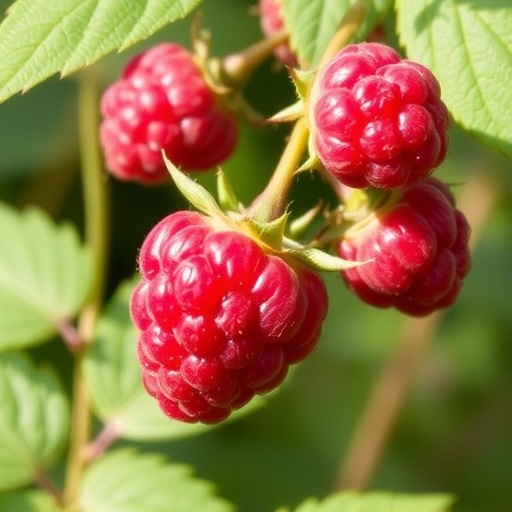
In a groundbreaking advancement poised to reshape raspberry cultivation and sustainability, researchers at Cranfield University have successfully demonstrated DNA-free gene editing in red raspberry (Rubus idaeus) protoplasts using CRISPR-Cas9 technology. This novel achievement marks the first peer-reviewed validation of CRISPR gene editing in raspberry, a major step toward accelerating the development of raspberry varieties with enhanced traits that could dramatically reduce post-harvest losses and improve crop resilience.
At the heart of this pioneering work lies the isolation of single-celled protoplasts from the leaf tissue of raspberry microplants cultivated under sterile tissue culture conditions. Protoplasts â plant cells devoid of their rigid cell walls â provide a unique platform for precise genome editing because they allow direct delivery of gene-editing components into the cell. Using ribonucleoprotein (RNP)-mediated transfection, the researchers introduced CRISPR-Cas9 complexes as pre-assembled proteins and guide RNAs, thereby circumventing the integration of foreign DNA into the plant genome.
This distinction is critical. Unlike traditional genetic modification, which often involves the stable insertion of foreign genes, the DNA-free CRISPR approach employed here induces targeted, heritable changes indistinguishable from natural mutations or those produced by conventional breeding methods. As no exogenous genetic material is incorporated, the resulting plants fall within the scope of Englandâs recent Genetic Technology (Precision Breeding) Act (2023), which permits non-transgenic edits for commercial cultivation and consumption. This positions the method as a regulatory-friendly avenue for precision breeding in raspberries.
The implications of this technology extend well beyond genetic proof-of-concept. Edited genes such as NPR1 â previously studied in tomato where modification enhanced resistance to grey mould â highlight the potential for driving disease resistance and shelf-life extension in raspberries. By conferring greater resilience to post-harvest pathogens and environmental stressors, these innovations could substantially reduce the staggering levels of food waste associated with soft fruit perishability, while simultaneously improving the economic efficiency of raspberry production.
Moreover, gene editing enables tailor-made improvements to other commercially valuable fruit qualities. Enhanced sugar content, increased fruit size, seedlessness, and boosted yield capacity are all attainable traits through the precise manipulation of the raspberry genome. Importantly, this accelerated breeding process bypasses the time-consuming and often unpredictable nature of traditional cross-breeding, which can take over a decade to yield near-market cultivars.
One of the remaining technical challenges involves the regeneration of fully grown raspberry plants from edited protoplasts â a well-documented hurdle in many crops due to the complexities of directing single cells through dedifferentiation and organogenesis. Achieving efficient plant regeneration will be a crucial focus of ongoing research, as it bridges the gap between editing isolated cells and realizing commercial-scale raspberry varieties embodying desired genetic improvements.
Beyond the laboratory, the potential societal and environmental impacts of this work are profound. By reducing spoilage and extending shelf life, the edited raspberries could decrease reliance on resource-intensive storage and transport infrastructures. Such improvements contribute to global food security goals and aid in mitigating the effects of climate change by curbing agricultural waste footprints. Additionally, enhanced crop resilience to heatwaves and other stresses associated with a changing climate will bolster the stability of raspberry production worldwide.
Ryan Creeth, the PhD student spearheading this research at Cranfield University, emphasized the strategic importance of harnessing DNA-free gene editing technologies across diverse crop species. He noted that applying cutting-edge precision breeding techniques will be instrumental in translating academic breakthroughs into actionable agricultural solutions, underscoring the necessity of sustained research efforts especially focused on plant regeneration protocols.
This research demonstrates an exemplary fusion of plant tissue culture, molecular genetics, and innovative genome engineering techniques. The use of RNP-mediated transfection â delivering CRISPR-Cas9 as proteins bound to guide RNAs â not only accelerates editing efficiency but also alleviates public and regulatory concerns regarding transgene presence. This method aligns with an emerging paradigm in plant biotechnology that prioritizes precision, safety, and regulatory compliance to foster broader adoption.
As the global demand for sustainable and nutritious food grows, scalable DNA-free genome editing platforms such as the one developed at Cranfield University promise to revolutionize soft fruit breeding. With potential ripple effects encompassing economy, ecology, and consumer preferences, this breakthrough paves the way for the next generation of raspberry cultivars that not only satisfy taste and quality but also contribute meaningfully to global sustainability objectives.
The study, entitled DNA-free CRISPR genome editing in raspberry (Rubus idaeus) protoplast through RNP-mediated transfection, is published in Frontiers in Genome Editing. Funded by BerryWorld Plusâ¢, it exemplifies the synergy between innovative research and industry collaboration aimed at delivering practical solutions to long-standing agricultural challenges.
As CRISPR technology continues to evolve and regulatory frameworks adapt to recognize its nuances, the door opens wider for rapid, precise, and responsible plant breeding that respects both nature and consumer expectations. This latest milestone in raspberry gene editing is a testament to the transformative potential of modern biotechnologies to reshape food systems for a more resilient and sustainable future.
Subject of Research: Cells
Article Title: DNA-free CRISPR genome editing in raspberry (Rubus idaeus) protoplast through RNP-mediated transfection
News Publication Date: 30-Jun-2025
Web References: https://www.frontiersin.org/journals/genome-editing/articles/10.3389/fgeed.2025.1589431/full
References: DOI 10.3389/fgeed.2025.1589431
Image Credits: Ryan Creeth, Cranfield University
Keywords: Genome editing; Food production; Environmental issues; Sustainable agriculture
Tags: advanced breeding methods for raspberriesCRISPR-Cas9 technology in agricultureDNA-free gene editing techniquesenhancing raspberry crop resilienceinnovative agricultural biotechnologymicroplant tissue culture practicesnatural mutations in plant breedingpeer-reviewed research in plant geneticsprotoplast isolation in plant researchraspberry gene editingreducing post-harvest losses in berriessustainable raspberry cultivation




